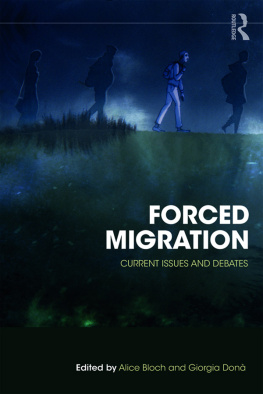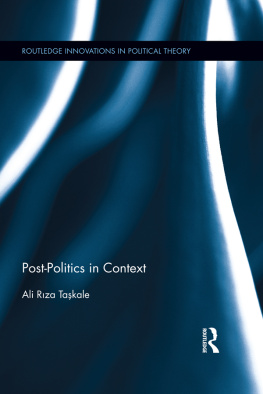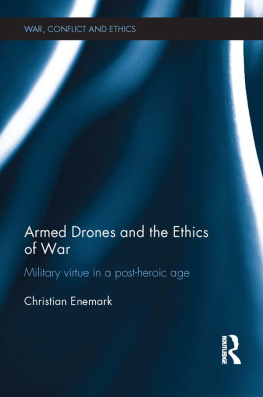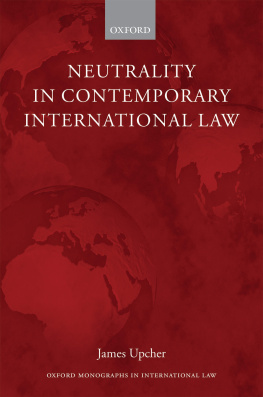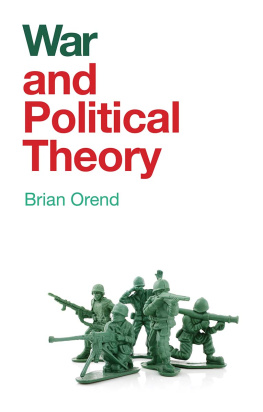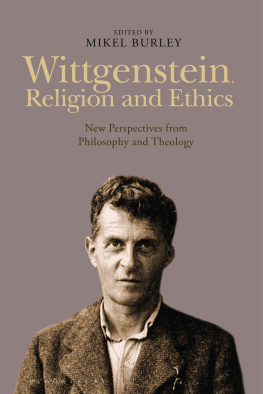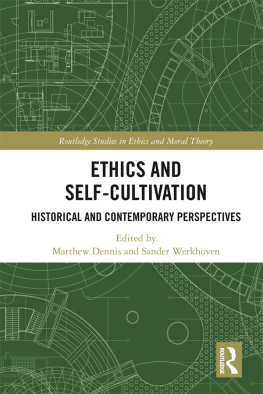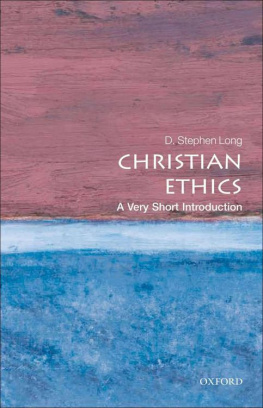ETHICS AND THE USE OF FORCE
Justice, International Law and Global Security
Series Editor: Howard M. Hensel
As the global community enters the 21st century, it is confronted with a wide variety of both traditional and non-traditional challenges to its security and even survival, as well as unprecedented opportunities for global socio-economic development. International law will play a major role as the international community attempts to address these challenges and opportunities while, simultaneously attempting to create a just and secure global order capable of protecting and promoting the common good of the whole of mankind.
The Ashgate Series on Justice, International Law and Global Security is designed to encourage and highlight analytical, scholarly works that focus on the ways in which international law contributes to the management of a wide variety of contemporary challenges and opportunities, while, simultaneously, helping to promote global justice and security.
Also in the series
The Prism of Just War
Asian and Western Perspectives on the Legitimate Use of Military Force
Edited by Howard M. Hensel
ISBN: 978-0-7546-7510-5
Remembering Hiroshima
Was it Just?
By Francis X. Winters
ISBN: 978-0-7546-7470-2
Why Not Preempt?
Security, Law, Norms and Anticipatory Military Activities
By Rachel Bzostek
ISBN: 978-0-7546-7057-5
The Legitimate Use of Military Force
The Just War Tradition and the Customary Law of Armed Conflict
Edited by Howard M. Hensel
ISBN: 978-0-7546-4980-9
Ethics and the Use of Force
Just War in Historical Perspective
JAMES TURNER JOHNSON
Rutgers University, USA
First published 2011 by Ashgate Publishing
Published 2016 by Routledge
2 Park Square, Milton Park, Abingdon, Oxon OX14 4RN
711 Third Avenue, New York, NY 10017, USA
Routledge is an imprint of the Taylor & Francis Group, an informa business
Copyright James Turner Johnson 2011
James Turner Johnson has asserted his right under the Copyright, Designs and Patents Act, 1988, to be identified as the author of this work.
All rights reserved. No part of this book may be reprinted or reproduced or utilised in any form or by any electronic, mechanical, or other means, now known or hereafter invented, including photocopying and recording, or in any information storage or retrieval system, without permission in writing from the publishers.
Notice:
Product or corporate names may be trademarks or registered trademarks, and are used only for identification and explanation without intent to infringe.
British Library Cataloguing in Publication Data
Johnson, James Turner.
Ethics and the use of force: just war in historical perspective. -- (Justice, international law and global security)
1. Just war doctrine. 2. Just war doctrine--History. 3. War--Religious aspects--Christianity. 4. War-- Religious aspects--Islam. 5. War (International law)
I. Title II. Series
172.4'2-dc22
Library of Congress Cataloging-in-Publication Data
Johnson, James Turner.
Ethics and the use of force: just war in historical perspective / by James Turner Johnson.
p. cm. -- (Justice, international law, and global security)
Includes index.
ISBN 978-1-4094-1857-3 (hardback) -- ISBN 978-1-3155-8038-8 (ebook)
1. Just war doctrine--History. 2. War--Religious aspects--Christianity--History.
I. Title.
BT736.2.J639 2011
241'.6242--dc22
2011003627
ISBN 9781409418573 (hbk)
ISBN 9781315580388 (ebk-PDF)
ISBN 9781317141181 (ebk-ePUB)
Contents
Introduction
The Use of History for Thinking About Morality and War
Acknowledgements
This book reflects the long engagement I have had with the historical tradition of just war, its contemporary implications, and its interrelations with religious thought, international law and political policy. While everything in this book is new in the sense of representing my most recent thinking about these issues, some of the chapters are based on material that previously appeared in scholarly publications. is a revised version of a paper originally published in the Journal of Religious Ethics 36.4 (December 2008), pages 54356. I extend my appreciation and thanks to the editors and publishers of each of the publications mentioned for their permission to use the articles noted in the present book.
Introduction
The Use of History for Thinking About Morality and War
Just War Thinking in Present-day Debate About the Use of Armed Force
Over the last 50 years, and especially over the last 30 or so years, the idea of just war has moved into the mainstream of American public discussion about the use of military force and the limits to be observed in using such force. An important example comes from the debate of 19901991 over the use of force to expel Iraq from Kuwait and restore Kuwait after Iraqs aggressive invasion, occupation, and annexation of that country, when not only did just war language figure in the arguments of moralists, philosophical and religious alike, but the first president Bush explicitly employed just war reasoning in a major speech, that to the National Association of Religious Broadcasters, to justify what became Operation Desert Storm. Nothing quite matched that presidential use of just war language in the 20022003 debate over the use of force against the Saddam Hussein regime in Iraq, but there was plenty of reference then by others to the just war idea and just war categories. Examples include the very different uses of the concept of just war by spokesmen for the National Conference of Catholic Bishops and the Southern Baptist Convention, or the equally different forms of just war reasoning laid out by Michael Walzer and former President Jimmy Carter on the op-ed page of The New York Times, or the presence of just war argument in academic conferences, scholarly papers, and books. (One such book was mine, The War to Oust Saddam Hussein, and all the examples just cited are discussed in of that book. See Johnson 2005: 4751, 5354, 5761.) Just war reasoning has continued to be applied in subsequent public debate about the U.S. military presence in Iraq and about the fight against Al Qaeda in Afghanistan and elsewhere. But in some ways the most striking and important use of just war thinking is that found not in the public debate but in the sphere of the U.S. military, where the presence of the idea of just war has become widespread, from professional education to training, from definition of rules of engagement to command and control decisions, and in the use of tactics, targeting, and weapons intentionally designed to minimize noncombatant harm. The normative landscape today is one significantly shaped by the presence of just war terminology, concepts, and reasoning.
This is not to say, though, that everyone making reference to the idea of just war today is speaking the same theoretical language. There are significant differences, not only in the conclusions reached, but in the conceptions of just war theory employed to reach those conclusions. In part this follows from the nature of the just war idea itself as defined by a historical tradition of thought coming together in a broad cultural consensus incorporating influences from a broad variety of sources, both theoretical and practicalchurch law and civil law, theological and philosophical ethical reasoning, thought about the proper shape and practice of government and the experience of the practice itself, military thinking and the experience of armed conflictand which in the modern period has been carried somewhat differently in customary and positive international law and theories of international order. All these streams of thought and experience have helped to shape contemporary debates over the use of armed force, though not all the forms of contemporary appeals to the idea of just war honor this historical tradition or seek to benefit from it.



